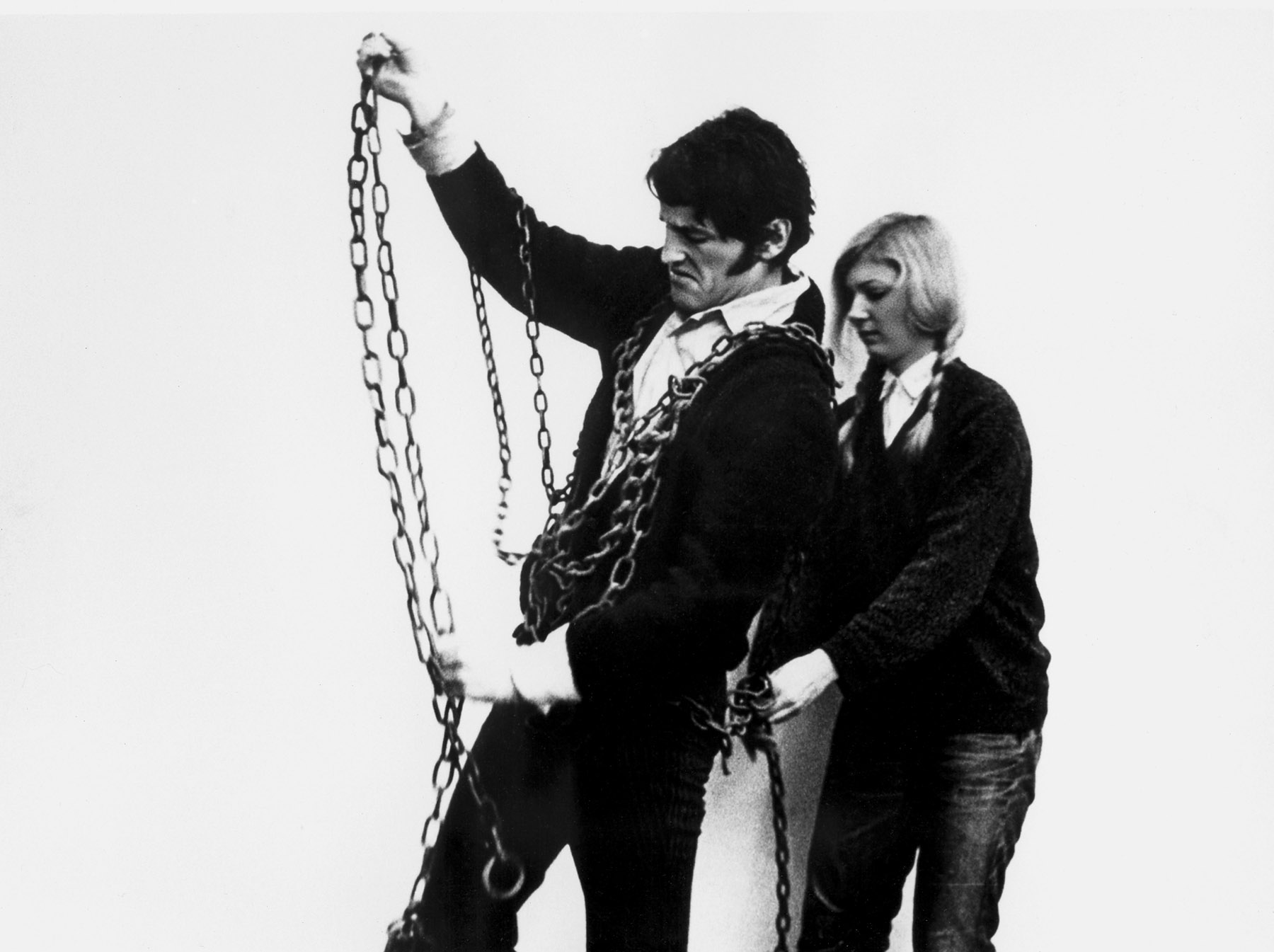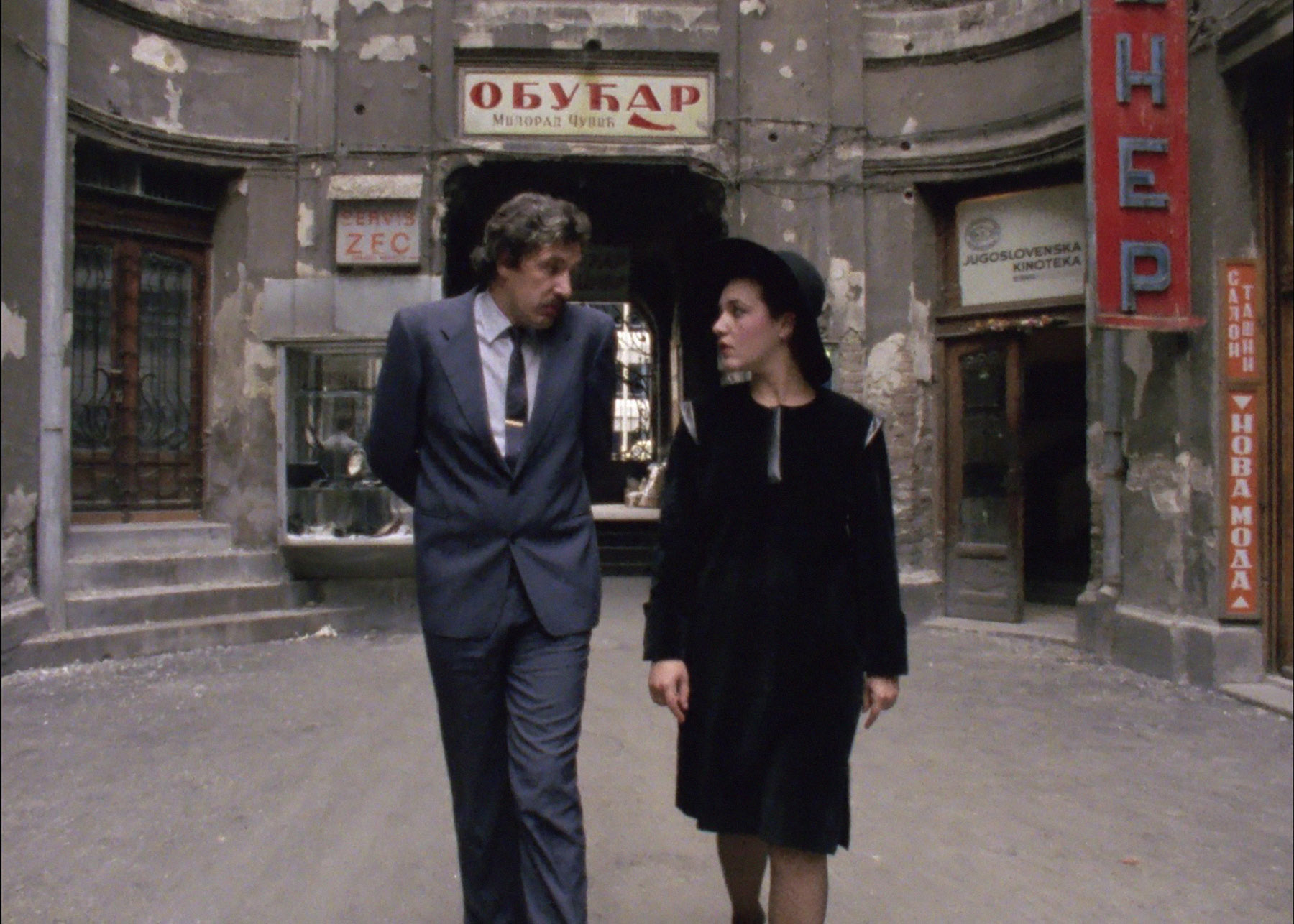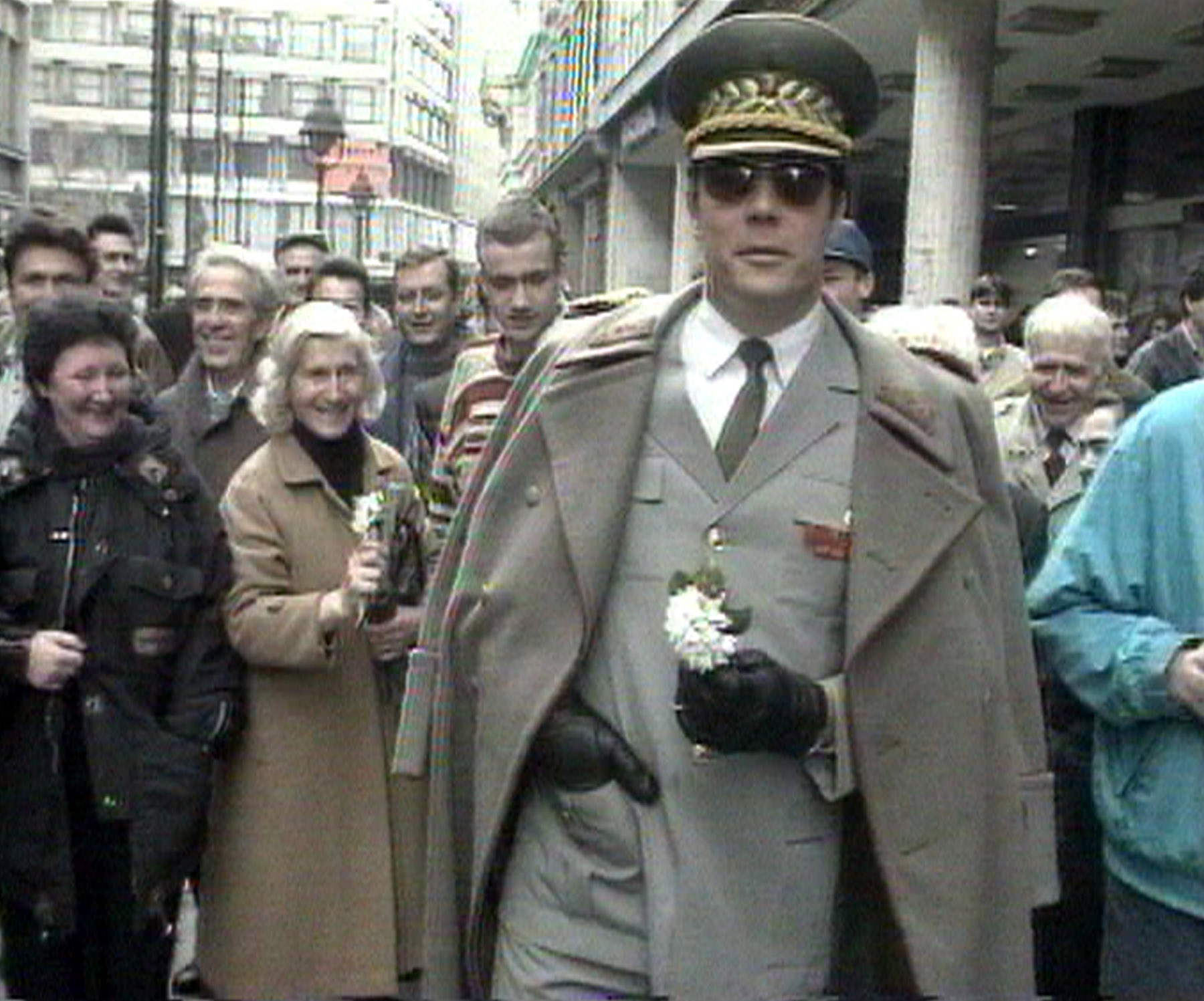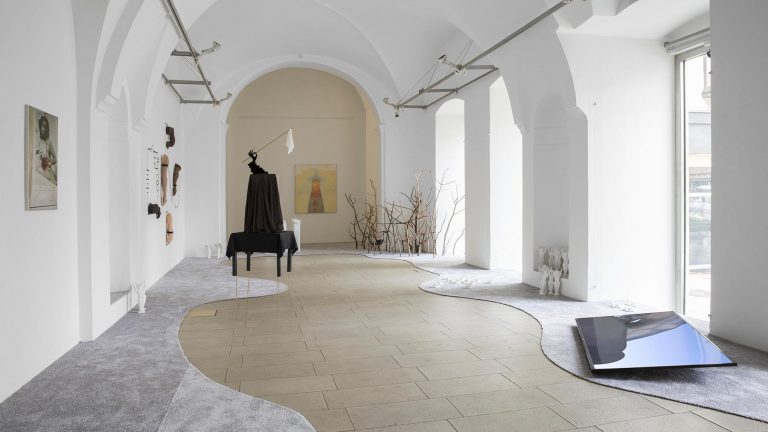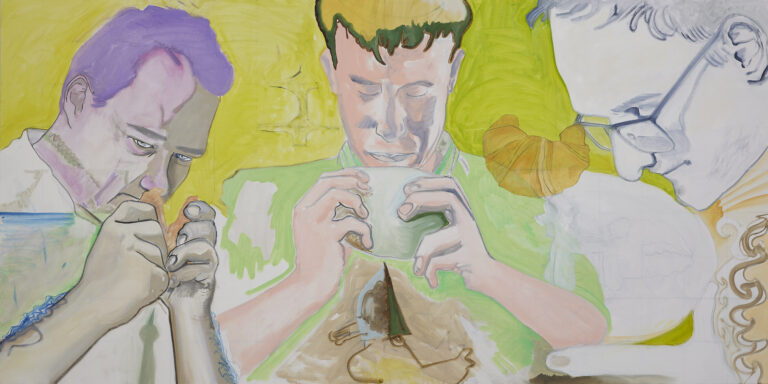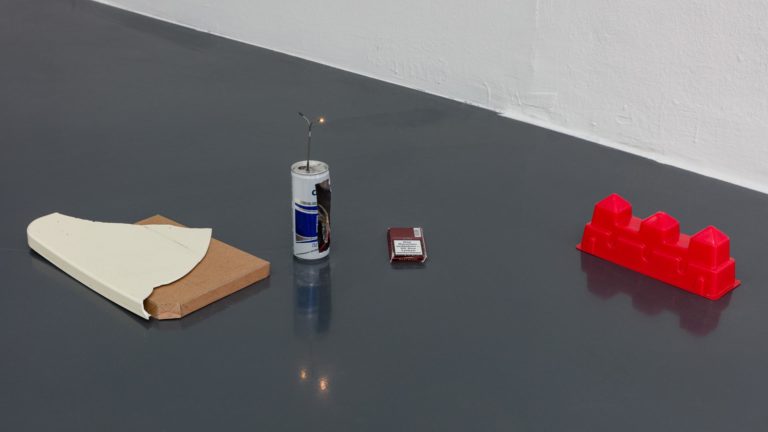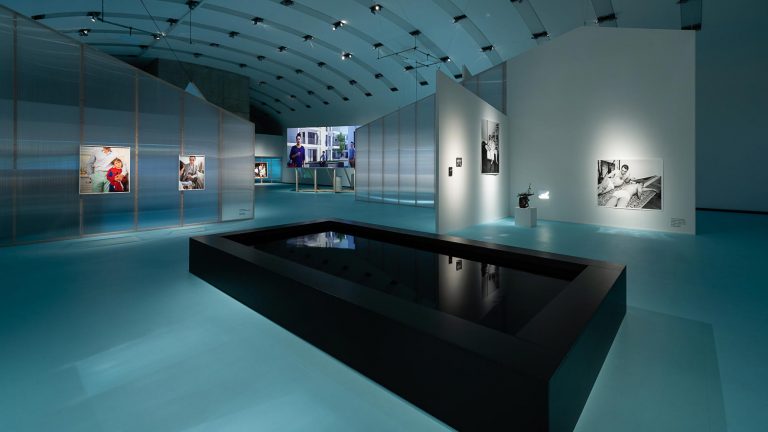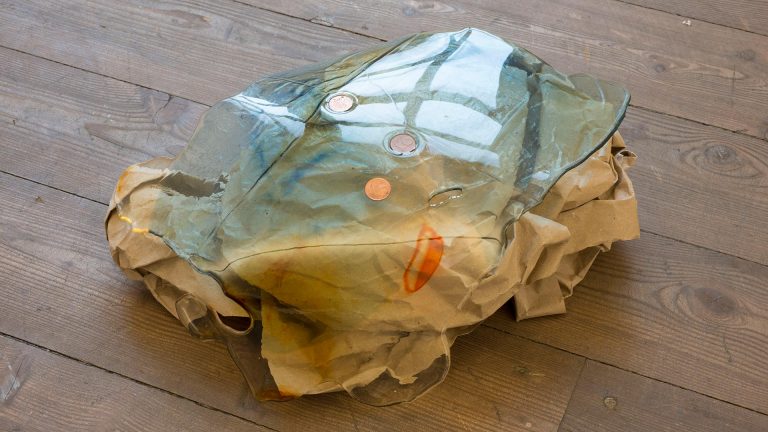Artist: Želimir Žilnik
Exhibition title: Shadow Citizens
Curated by: What, How & for Whom / WHW (Ivet Ćurlin, Ana Dević, Nataša Ilić and Sabina Sabolović), Assistant curator: Laura Amann
Venue: Kunsthalle Wien, Vienna, Austria
Date: October 24, 2020 – January 17, 2021
Photography: all images copyright and courtesy of the artist and Kunsthalle Wien
Note: Exhibition booklet can be found here
Shadow Citizens reexamines the radical film praxis and extensive œuvre of filmmakerŽelimir Žilnik (b. 1942, lives and works in Novi Sad, Serbia) within an exhibition context. From his beginnings in the lively amateur film scene of Yugoslavia in the 1960s, Žilnik has gone on to make more than fifty films, including a number of feature films and TV productions, often in the genre of docudrama.
Žilnik received international recognition early on, winning the Golden Bear for Best Film at the 1969 Berlin International Film Festival for his first feature film, Early Works. At the same time, his films encountered political opposition, and in the early 1970s he left Yugoslavia for West Germany, where he realized several independent films, including some of the earliest films dealing with the topic of guest workers (Gastarbeiter). In the 1980s, after leaving Germany—due to his films once again facing political opposition and censorship—and returning to Yugoslavia, he made numerous TV and feature films in which he portrayed early symptoms of the country’s growing social conflicts, continuing in the 1990s and 2000s with films dealing with the maladies of the post-socialist transition as well as questions of migration.
Many of Žilniks films foretold, and later on chronicled, real-world events such as the dissolution of Yugoslavia, the economic transition from socialism to a neoliberal order, the elimination of workers’ rights, and the wider social erosion related to labor and migration. The exhibition’s title, Shadow Citizens, reflects Žilnik’s lifelong focus on invisible, suppressed, and under- and misrepresented members of society and relates to themes that run through the director’s filmography, such as questions of shadow economies, borders, migration, labor, terrorism, revolutionary fatigue, clashes of parallel modernisms, and more.
As a concept, “shadow citizens” points to a form of political engagement toward “amateur politics” – the imaginative and subversive non-normative knowledge and alternative sensibilities that always lie dormant in a society and occasionally visibly push back against “politics as usual.” According to urban theorist Andy Merrifield, amateur and professional politics are in fact political divisions that can be reclaimed and moved like tectonic plates (Andy Merrifield, The Amateur: The Pleasures of Doing What You Love, London: Verso, 2017). Courageous amateurism is prominent in Žilnik’s films, both as a concept and as a method. The notion of shadow citizens, conceived as different minorities that are increasingly becoming majorities everywhere, runs through Žilnik’s œuvre, where it is taken up as a possibility to imagine a new concept of citizenship that pushes current limits and borders. Different facets of the potentials of shadow citizens and the pressures of the amateur undercurrent in emancipatory politics and artistic production tackled in Žilnik’s films also shed light on contemporary social and political urgencies.
The curators, What, How & for Whom / WHW, on this exhibition: “A wonderful and inspiring red thread in Žilnik’s work is a deep and committed interest in the stories of the people he meets and works with. With a decline in social and economic conditions, the position of what we term ‘shadow citizens’ is becoming increasingly common in societies across the world. As curators, we have had the privilege of knowing Želimir Žilnik for many years, and more than ever we see the relevance of his artistic and political vision for our present times. We have never stopped learning from his political clarity, his tenderness, and his uncompromised integrity. The experiences and voices of the people we encounter in his films can inspire us all to be more responsible, thoughtful, and caring toward our fellow human beings and the planet we share.”
Shadow Citizens at Kunsthalle Wien is an expanded version of a show developed in partnership with the Edith-Russ-Haus for Media Art in Oldenburg, Germany, in 2018 and later also shown at Gallery Nova in Zagreb. The exhibition builds on the long-term research on Žilnik by kuda.org (Novi Sad), which is gathered at www.zilnikzelimir.net.
Želimir Žilnik’s films shown in the exhibition and at special screenings
Shadow Citizens presents the stories and voices of Zilnik’s “shadow citizens” through film excerpts, shorts, as well as feature films, and documentary material – thus covering Žilnik’s entire œuvre and its critical and public reception over the years. The exhibition also features rarely screened films and material, such asPublic Execution (1974), shot in Germany, and a TV reportage on The Gastarbeiter Opera (1977), Žilnik’s only theater play.
All of Žilnik’s iconic shorts from the beginning of his career are screened in the framework of the exhibition: Newsreel on Village Youth, in Winter (1967); The Unemployed (1968); Little Pioneers (1968); June Turmoil (1969); Black Film (1971); Uprising in Jazak (1973); Public Execution (1974); I Don’t Know What That Should Mean (1975); and Inventory (1975).
The selection of feature filmsis grouped in two projection rooms, one focused on female characters in Žilnik’s work with Early Works (1969); Paradise. An Imperialist Tragicomedy (1976); Pretty Women Walking Through the City (1986); Marble Ass (1995); and One Woman – One Century (2011), and the other on his rarely shown TV productions: The Comedy and Tragedy of Bora Joksimović (1977); Volunteers (1979); Vera and Eržika (1981); Dragoljub and Bogdan: Electricity (1982); The First Trimester of Pavle Hromiš (1983); Brooklyn – Gusinje (1988); and Black and White (1990).
For the first two weeks of the exhibition, there will be a special chance to also see the latest Žilnik movie, The Most Beautiful Country in the World, which was filmed in Vienna in 2018.
Shadow Citizens also presents a line of research that focuses on the context within which Žilnik got his start – the amateur cine clubs that existed in many cities in Yugoslavia. A variety of films produced in the 1950s and ’60s within the cine clubs in Zagreb, Belgrade, Ljubljana, and Split show how their activities were linked to the strongly international and avant-garde context of GEFF – Genre Experimental Film Festival, which was organized from 1963 to 1970 in Zagreb. This section was curated by Ana Janevski, curator in the Department of Media and Performance at the Museum of Modern Art, New York.
Installation view: Želimir Žilnik. Shadow Citizens, Kunsthalle Wien 2020, photo: © eSeL.at – Lorenz Seidler
Installation view: Želimir Žilnik. Shadow Citizens, Kunsthalle Wien 2020, photo: © eSeL.at – Lorenz Seidler
Installation view: Želimir Žilnik. Shadow Citizens, Kunsthalle Wien 2020, photo: © eSeL.at – Lorenz Seidler
Installation view: Želimir Žilnik. Shadow Citizens, Kunsthalle Wien 2020, photo: © eSeL.at – Lorenz Seidler
Installation view: Želimir Žilnik. Shadow Citizens, Kunsthalle Wien 2020, photo: © eSeL.at – Lorenz Seidler
Portrait What, How and for Whom / WHW & Želimir Žilnik, Kunsthalle Wien 2020, photo: © eSeL.at – Lorenz Seidler
Portrait What, How and for Whom / WHW & Želimir Žilnik, Kunsthalle Wien 2020, photo: © eSeL.at – Lorenz Seidler
Portrait Želimir Žilnik, Kunsthalle Wien 2020, photo: © eSeL.at – Lorenz Seidler
Želimir Žilnik, Freedom or Cartoons (on-set photo), 1972, courtesy the artist, photo: Andrej Popović
Želimir Žilnik, Vera and Eržika (film still), 1981, © Radio Television of Vojvodina, courtesy the artist
Želimir Žilnik, Early Works (on-set photo), 1969, photo: Andrej Popović, courtesy the artist
Želimir Žilnik, Brooklyn – Gusinje (film still), 1988, © Radio Television of Serbia, courtesy the artist
Želimir Žilnik, Tito among the Serbs for the Second Time (film still), 1994, courtesy the artist
Želimir Žilnik, Pretty Women Walking through the City (film still), 1986, courtesy the artist
Želimir Žilnik, One Woman – One Century (on-set photo), 2011, courtesy the artist, photo: Sarita Matijević
Želimir Žilnik, Logbook_Serbistan (film still), 2015, courtesy the artist
Želimir Žilnik, Marble Ass (on-set photo), 1995, courtesy the artist, photo: Miodrag Milošević
Želimir Žilnik, The Most Beautiful Country in the World (film still), 2018, courtesy the artist











